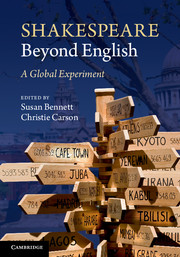Book contents
- Frontmatter
- Contents
- List of Illustrations
- List of colour plates
- Notes on contributors
- Foreword
- Acknowledgements
- Introduction
- The Globe to Globe Festival: An Introduction
- Performance Calendar
- Week One
- Week Two
- Chapter Seven Performing cultural exchange in Richard III
- Chapter Eight ‘A girdle round about the earth’
- Chapter Nine Intercultural Rhythm in Yohangza's Dream
- Chapter Ten Art of darkness
- Chapter Eleven Neo-liberal Pleasure, Global Responsibility and the South Sudan Cymbeline
- Chapter Twelve Titus in No Man's Land
- Chapter Thirteen Tang Shu-wing's Titus and the acting of violence
- Chapter Fourteen ‘A strange brooch in this all-hating world’
- Chapter Fifteen ‘We want Bolingbroke’
- Chapter Sixteen O-thell-O
- Week Three
- Week Four
- Week Five
- Week Six
- Afterwords
- Index
- Plate section
- References
Chapter Eleven - Neo-liberal Pleasure, Global Responsibility and the South Sudan Cymbeline
Published online by Cambridge University Press: 05 June 2014
- Frontmatter
- Contents
- List of Illustrations
- List of colour plates
- Notes on contributors
- Foreword
- Acknowledgements
- Introduction
- The Globe to Globe Festival: An Introduction
- Performance Calendar
- Week One
- Week Two
- Chapter Seven Performing cultural exchange in Richard III
- Chapter Eight ‘A girdle round about the earth’
- Chapter Nine Intercultural Rhythm in Yohangza's Dream
- Chapter Ten Art of darkness
- Chapter Eleven Neo-liberal Pleasure, Global Responsibility and the South Sudan Cymbeline
- Chapter Twelve Titus in No Man's Land
- Chapter Thirteen Tang Shu-wing's Titus and the acting of violence
- Chapter Fourteen ‘A strange brooch in this all-hating world’
- Chapter Fifteen ‘We want Bolingbroke’
- Chapter Sixteen O-thell-O
- Week Three
- Week Four
- Week Five
- Week Six
- Afterwords
- Index
- Plate section
- References
Summary
The origin story of the South Sudan Theatre Company's (SSTC) Cymbeline is by now quite well known. It began with a dream: ‘I used to lie in the bush under the stars reading Shakespeare's plays, not thinking about the killing that would take place in the morning’, the South Sudan Culture Minister wrote to the Globe Theatre Tom Bird as the SSTC sought a place in the Globe to Globe Festival, instantly hooking Bird with his ‘compelling and irresistible’ narrative. Cymbeline was assigned, and suddenly the world's newest nation – South Sudan was officially formed in July 2011, six years after the official end of the Sudanese civil war – became responsible for creating a piece of theatre that could speak to new freedom; represent its capacity to make world-class performance at the heart of Western culture; honour its ravaged history; and announce its arrival on the world stage as successful, joyous, invigorating, inspiring.
That's a tall order.
In this chapter, I am going to be deliberately cynical in order to tease out some of the ideological and political challenges that can arise when a show like the SSTC’s Cymbeline appears at a venue like Shakespeare’s Globe. Using a cultural materialist approach, I will argue that the South Sudan Cymbeline – despite its indisputable emotional power for audiences and actors alike, and despite the real potential it holds to help launch a formal theatre culture in South Sudan – functioned at the Globe primarily as a neo-liberal social good. To put this another way: the SSTC’s Cymbeline was anticipated in the London press as a piece of work that staged the triumph of the African spirit over extreme adversity, rather than as a performance event that brought into collision two extremely different experiences of living under a globalized reality (in post-industrial, tourist-centred London; in physically ravaged but oil-rich Sudan).
- Type
- Chapter
- Information
- Shakespeare beyond EnglishA Global Experiment, pp. 101 - 109Publisher: Cambridge University PressPrint publication year: 2013



